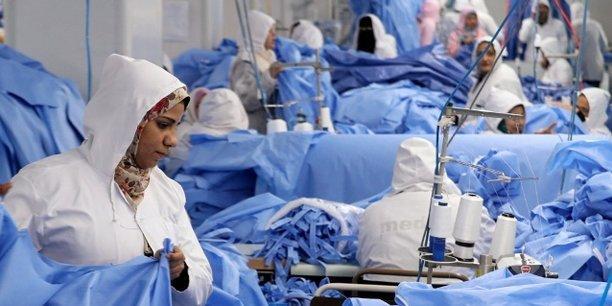
 The Africa-France and Africa-EU summits will be held in 2021, but the proposals generally put forward are not well suited to the challenges. The transfer to Africa and the EU of part of the production of goods manufactured in China could solve problems.
The Africa-France and Africa-EU summits will be held in 2021, but the proposals generally put forward are not well suited to the challenges. The transfer to Africa and the EU of part of the production of goods manufactured in China could solve problems.
When the work of the summits runs counter to Africa's development
At a time when extreme poverty is wreaking more havoc than ever, a population that includes 250 million people suffering from malnutrition in an Africa that is virtually devoid of industry and emits very little CO2, could in the majority of cases consider French, European or international recommendations to be out of step and counterproductive.The digital transformation and the green transition, placed at the top of the list of priorities, must certainly be included but do not constitute complete solutions. It is to be feared that this off-the-ground focus will prevent rapid development in Africa and will not allow for a reduction in poverty.
Growth for Africa and its partners
It is now time to build an efficient paradigm. The installation of infrastructure and industrial tools by often Western companies, followed by the creation of a fabric of local businesses, would generate tens of millions of jobs in sub-Saharan Africa that are more lucrative than those in the informal sector. This would modernize Africa while offering the possibility for certain countries to escape the Chinese trap of African debt. New exchanges between African states and their partners, often French, European, but also American or sometimes Asian, including Japan, would promote the growth of each of them. A concerted industrial integration would best preserve the environment.
Many countries around the world must now understand that China will not be their growth driver
In most developed countries, domestic consumption and the stimulus plans implemented during the Covid-19 pandemic will not increase growth that has been reduced by deindustrialization and delocalization. It is true that some Western companies producing high value-added products (German cars or French luxury goods) are doing well, but China manufactures most of its own consumer goods and will not be the growth relay that Westerners have been waiting for in vain since the transfer of their technologies. Moreover, given their uncompetitive wage costs in the context of globalization, Western countries will not see massive reindustrialization and the jobs that have gone to China will rarely come back home. But as we have already written in Le Figaro, "Reducing our dependence on China is possible! ".
Economic outlook for a continent that could have 2.5 billion inhabitants by 2050
Countries that are often in a growth slump in the West must opt for solutions that will enable them to get out of the rut. On Europe's doorstep, a continent with a population of 1.3 billion today and 2.5 billion in 2050. The economic prospects are enormous and could generate activity in countries whose companies would participate in the industrialization of Africa. Mechanisms for pooling labor costs, which are often high in the West and lower in Africa, would recreate a balance and thus promote job creation on both continents.
Aligning the planets to develop Africa, contain China and ensure growth
China's responsibility for the spread of the Covid-19 pandemic, which caused more than 3 million deaths and devastated the global economy, has intensified the international community's distrust of China. Even if, for lack of other funding, some countries still request it, almost the entire world is aware of the need to curb the rise in power of an arrogant China that clearly displays its hegemonic and sometimes warlike ambitions. The Chinese infernal trap of the African debt, the capture of rare or agricultural lands and other wealth of the continent, threaten the independence of African countries. The EU, although the signing of the EU-China agreement in principle on investments may raise questions, claims to be less fooled now. US President Joe Biden is asserting his willingness to curb Chinese expansionism and is strengthening the Quadrilateral Security Dialogue (Quad) with India, Japan and Australia. And finally, we can hope that the Nigerian Ngozi Okonjo-Iweala, new director of the WTO since March 1, 2021, will be less lax than her predecessors towards China, which violates the rules.
A project that would meet the expectations of young people and could gradually replace ODA
At the end of 2020, in an article published on La Tribune Afrique entitled "Sub-Saharan Africa: capitalism could succeed where development aid has failed for 60 years", we proposed to gradually turn the page on official development assistance, the amount of which has exceeded $1,000 billion but has not reduced informal employment, which still concerns 85 to 89% of the active sub-Saharan population. Organized businesses would offer better-paid jobs. The reasonable increase in minimum production wages that we advocate in our studies on the International Convention for a Global Minimum Wage project would also contribute to a rise in the standard of living of the population and accelerate Africa's development. This could respond to the wish of many Africans who would like to make a better living from their work and break away from assistance that is certainly benevolent and often indispensable, but which reflects a negative image that they want to change. The process of industrial integration would increase the budgetary resources of the States, would contribute to the securing of territories and would reduce the migratory flows of the immense continent whose modernization would require the involvement and energy of its youth.
We can transfer a part of our industrial production from China to Africa
Only a production regionalization plan for Europe and Africa, concrete and structuring but also taking into account the new regional geo-economic and geopolitical parameters, could succeed. A financial involvement of each of the signatory countries that would like to strengthen their economic presence to increase their trade with Africa within the framework of the program, would be essential. Companies from these countries could often benefit from support to facilitate their establishment (recruitment and training, legal, fiscal and administrative assistance, financing, studies, etc.) which would also contribute to the attractiveness of sub-Saharan Africa. We will be able to build global industrial schemes within which they can project themselves and which will convince them to move part of their production. We will have to look for sectoral complementarity to create efficient and coherent ecosystems reinforced by blockchains. This proximity will allow to reduce the transport of materials or parts within global value chains (GVC).
Targeted program to be efficient and easily financed
The cost of building industrial bases, including road, rail, airport or port access, energy supply, telecommunications networks, road works, waste management, but also security devices, housing, schools, medical centers and essential shops, would be eligible for financing by major international institutions and donor countries within the framework of Africa's development. The amount spent for each industrial site that would be built every 2 or 3 years would be around 3/5 billion euros.
A purpose that could unite
Outside a protective framework such as the one recommended, industrialization in Africa would cause irreversible environmental damage. It would therefore be advisable to avoid the disorderly construction of a multitude of industrial zones without overall coherence. In contrast to international or local economic policies or proposals, which are often hollow and without a future, but which have been sclerotic for 60 years in the development of sub-Saharan Africa, the Africa Atlantic Axis program could, on the contrary, be implemented soon, if the populations of the African countries most concerned so wish. The international financial institutions could only join this project of progress for Africa. Many Western companies that have been thinking of leaving China for several years would agree to invest in this great project.
Indispensable collaboration between the two continents
Pan-Africanism is often mentioned, but the time for industrialization is very long. Let us remember that it is the transfer of Western technologies that has allowed China to develop considerably in about twenty years. African populations, who are struggling to feed themselves today, cannot wait another half century or more. It is therefore necessary to be pragmatic. It is rather unlikely that Africa will be able to prosper without the help of Europe, which should itself rely on Africa to generate growth again.
An ethical model for a reasoned industrialization
More local production and less transportation of goods, the application in Africa of the World Minimum Wage, which would allow parents to send their children to school, more education and higher living standards that would eventually lead to a moderation of the birth rate and a reduction in global greenhouse gas emissions, could be some of the benefits of the model.
Francis JOURNOT is a consultant and entrepreneur. He leads the program for the industrialization of sub-Saharan Africa or Plan for a regionalisation in the Europe Africa zone or Africa Atlantic Axis program and does economic research for the International Convention for a Global Minimum Wage
Documentation
https://www.vie-publique.fr/en-bref/278145-ue-afrique-quel-partenariat-pour-2021
https://www.europarl.europa.eu/doceo/document/A-9-2021-0017_FR.html